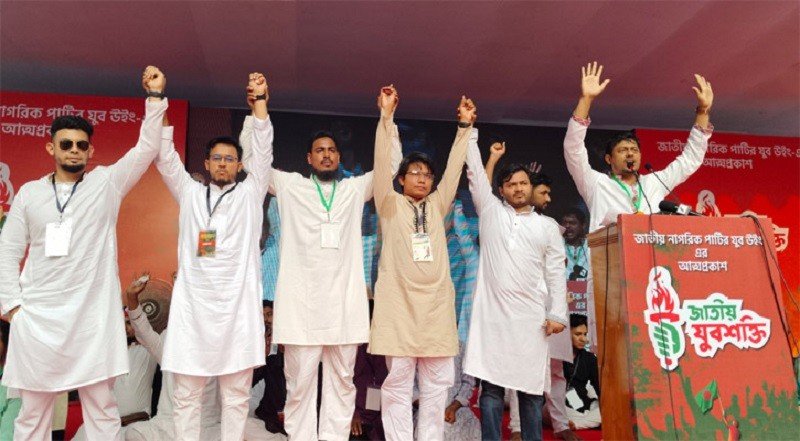NCP unveils youth wing ‘Jatiya Jubo Shakti’
Published: 16 May 2025, 9:46:09

Jatiyo Nagorik Party’s (NCP) youth wing, ‘Jatiya Jubo Shakti’ declared its ambition for sweeping political reform and constitutional change following July uprising, marking shift in nation’s political landscape.
On Friday, they shared comprehensive declaration outlining their vision for transforming governance and establishing what they term “a new republic” based on dignity, sovereignty and youth leadership after their launching event at Abrar Fahad Avenue of capital’s Gulisthan.
Advocate Md. Tarikul Islam has been announced as the Convener of the newly declared committee of ‘National Youth Power’. Additionally, Dr. Zahidul Islam has been appointed as the Member Secretary, and Engineer Farhad Sohel as the Chief Organizer. The full convening committee will comprise 131 members.
The declaration, titled “Youth’s Resolve for a Dignified Bangladesh and a New Political Settlement,” positions the organisation as direct successors to July’s historic student uprising which saw widespread protests across the country.
“This uprising was not merely an outburst of anger—it was the birth of a new political imagination,” states the document, which honours those killed and injured during demonstrations. The movement claims their efforts represent continuation of political struggles dating back to anti-colonial movements of 1947 and the 1971 liberation war.
Central to their platform is demand for completely new constitution and political framework. The group envisions governance rooted in “responsibility and empathy” rather than traditional power structures, with citizenship dignity becoming practical reality rather than theoretical concept.
The declaration introduces “Bangladeshism” as core ideology—described as sovereign philosophy independent from global powers yet distinctly anti-fascist and anti-imperialist. This approach supposedly draws from nation’s “history, geography, culture, economy and struggle” while positioning Bangladesh as potential regional leader.
Youth representation forms crucial element of proposed reforms, with movement stating emphatically: “The parliament and Bangladesh of tomorrow will belong to the youth and new generation.”
Women’s leadership receives particular emphasis, with declaration asserting young women “will be leaders of the new republic” whose “courage, decision-making and capabilities can flourish freely” in reconstructed society.
Economic proposals focus on justice and accessibility alongside growth, demanding state investment in “creative employment, innovation and moral education” to address problems including unemployment, barriers to entrepreneurship and widespread drug abuse affecting young Bangladeshis.
The declaration also highlights national security as responsibility shared between military, policymakers and youth populations—describing their involvement as “strategic necessity” for protecting sovereignty across borders, information systems, climate disasters and food security.
Jatiya Jubo Shakti presents itself as generational bridge, stating: “We carry the spirit of 1947’s freedom, are inspired by the sacrifices of the 1971 liberation war, and are pledged to the oath of the 2024 uprising.”




